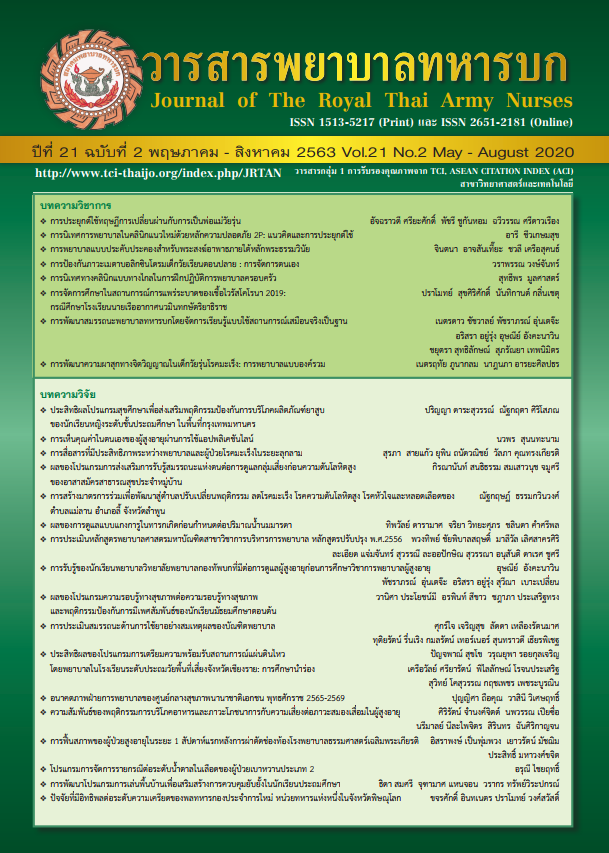Formatively Assessing Expected Learning Outcomes of Undergraduate Nursing Students Enrolling Ramathibodi Nursing Curriculum Developed using Asian University Network-Quality Assurance (AUN-QA) Criteria
Keywords:
Expected learning outcomes, Asian University Network-Quality Assurance (AUN-QA) CriteriaAbstract
This study aims at formatively assessing students’ achievement of the Program Learning Outcomes (PLOs) which was developed using the Asian University Network-Quality Assurance (AUN-QA) Criteria. Although the PLOs were developed for students to achieve before completing the program, the expected learning outcomes for the completed second year students as the half-way of the program length were assessed. Ten expected learning outcomes which were developed based on the levels of learning from Bloom’s taxonomy were directly used as a tool comprising 5 levels of achievement ranging scales from “not achieve at all, “least achieve”, “less achieve”, “achieve”, and “most achieve”. The students were also advised to address factors for successful and unsuccessful achievement. Two hundred and twenty-three nursing students of Ramathibodi School of Nursing were recruited. It was found that 195 students (87.44%) responded to the assessment. The students identified various levels of achievement from “not achieve at all” to “most achieve” in each item. Factors as barriers and facilitators of achievement were identified. The findings can be used as inputs to develop cognitive, skills, and affective domains for students to be ready for further study and be able to achieve the program learning outcomes. The identified factors can also be brought into considerations for program revision and design.
Downloads
References
Parinya R, Teeranut H. Role chammge experience: From nursing students to Registered nurses. Thai Journal of Nursing Council 2012; 27 (2): 51 – 62. (in Thai)
Arpaporn P. Survey results of Bangkokthonburi University nursing student attributes graduated on academic year B.E. 2559 according employers’ needs. Bangkok: Faculty of Nursing 2016. (in Thai)
Guraya S Y, Barr H. The Effectiveness of nterprofessional Education in Healthcare: A Systematic Review and Meta-Analysis. Kaohsiung Journal of Medical Science 2018; 34(3): 160 – 165.
Manurung K. Creative teachers and effective teaching strategies that motivate learners to learn. Indonesian Journal of Science Education 2012; 2(1):1-8.
Bidambadi NS, Isfahani AN, Rouhollaji A, Khalili R. Effective teaching methods in higher education: requirements and barriers. Journal of Advances in Medical Education & Professionalism 2016; 4(4):170-178.
Jensen M. Personality Traits, Learning and Academic Achievements. Journal of Education and Learning 2015;4(4):91-117.
Faisal RA. Influence of Personality and Learning Styles in English Language Achievement. Open Journal of Social Sciences 2019; (4):304-324.
Lertsakornsiri M, Khampunyo C. Factors associated with health – promoting behaviors of nursing students at Saint Louis College during practice in the health care service. Naresuan University Journal: Science and Technology 2017; 3(25): 67 – 76. (in Thai)
Suksatan W. Factors related to health promoting behaviors of Suansunandha nursing students. The 3rdNational Conference “TECHCON 2017” and the 1st International Conference, at Siam Technology College. 2017: 252 – 258.
Downloads
Published
How to Cite
Issue
Section
License
บทความหรือข้อคิดเห็นใดใดที่ปรากฏในวารสารพยาบาลทหารบกเป็นวรรณกรรมของผู้เขียน ซึ่งบรรณาธิการหรือสมาคมพยาบาลทหารบก ไม่จำเป็นต้องเห็นด้วย
บทความที่ได้รับการตีพิมพ์เป็นลิขสิทธิ์ของวารสารพยาบาลทหารบก
The ideas and opinions expressed in the Journal of The Royal Thai Army Nurses are those of the authors and not necessarily those
of the editor or Royal Thai Army Nurses Association.






